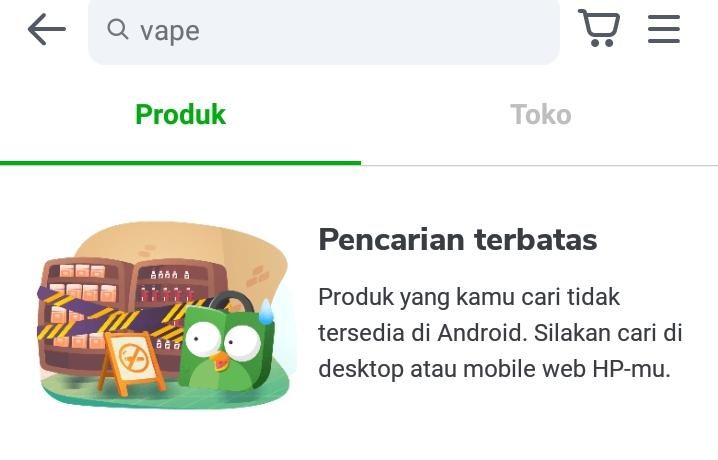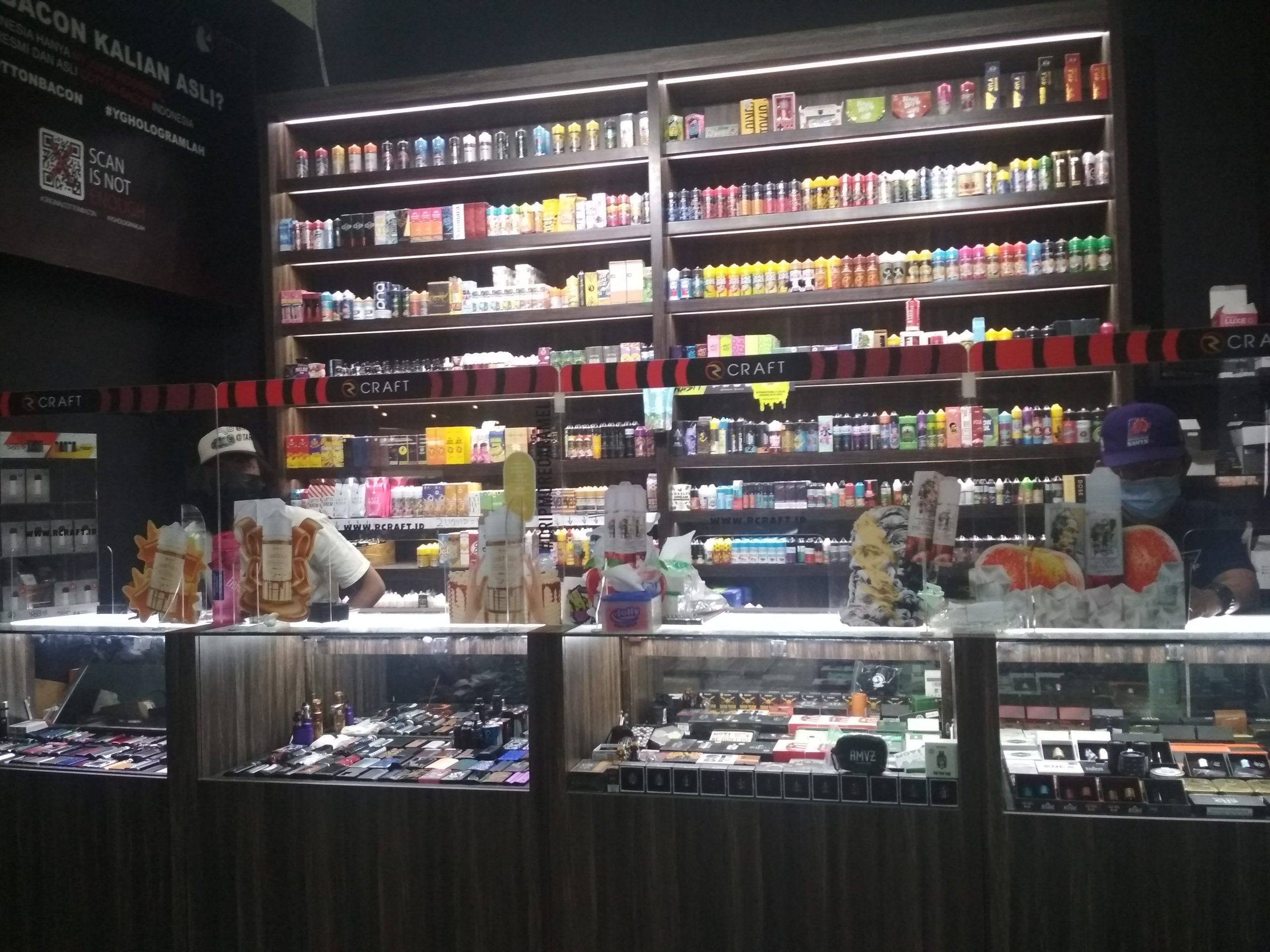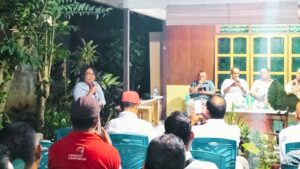It has been more than a year that Anggi Aldian no longer visit his regular vape kiosk in Kelapa Gading, North Jakarta. Shopping for e-cigarette liquid vapor in online markets and social media is now easier and more complete. “There are many choices of new products that are sold online,” Anggi said to Jaring.id in a phone interview on Friday, September 10, 2021.
Simply by typing the keyword “e-cigarette,” Anggi will be presented with various brands, both illegal and legal. Legal, in this case, refers to the labeling of excise stamps attached to electronic cigarette packages, while illegal is the other way around. “Especially on Instagram, it’s really easy (to find e-cigarettes) because there are no restrictions,” he said.
Since getting the liquid cigarette is very easy, this man, who has been consuming e-cigarettes since 2012 has even experienced symptoms of ‘vape tongue’—a condition when the tongue and smell are no longer sensitive to the taste of the e-cigarettes. This situation also often happens to his colleagues who have been smoking e-cigarettes for more than five years. “It’s a response of the tongue. It happened to me,” he said. To restore the taste on his tongue, Anggi had to take turns sucking two variants of the flavor of the e-cigarette liquid. “If it’s bland, you have to change the flavor,” he added.
Another e-cigarette smoker, Garet Darmawan, said that he had not been able to leave the offline stall to buy cigarette liquid or simply replace the wire attached to the vape product. “I always keep myself updated at the vape store,” he told Jaring.id by telephone on Friday, September 10, 2021.
The man from Sleman, Yogyakarta Special Region admitted that he started using vape in 2018 or a year before giant companies such as Google, Facebook and Instagram banned advertisements for selling e-cigarettes on their respective platforms. At that time, he was persuaded by e-cigarette advertising services circulating in cyberspace. “I used to buy it on Facebook. There was a buying and selling forum,” said Garet.
Although there are community policies for each social media platform, the circulation of e-cigarettes on social media is fairly easy to find. Jaring.id can still access online storefronts selling cigarettes and e-cigarettes when using a mobile phone with the iOS operating system.
Meanwhile, when entering the keywords “vape” and “e-cigarette” or “liquid vapor” in the search feature in one of the marketplaces using an Android-type mobile phone, consumers will not find the item they are looking for. Even so, consumers can still access online storefronts when searching for goods using the other operating systems or computers.

In fact, the Ministry of Communication and Information Technology has actually issued a Circular Letter of the Minister of Communication and Information of the Republic of Indonesia Number 5 of 2016 concerning Limitations and Responsibilities of Platform Providers and Traders (Merchant) for Trading Through Electronic Systems in the Form of User Generated Content.
The policy confirms the prohibition on marketing goods or services that contain providers or access to drugs, addictive substances such as nicotine and psychotropics. This is also confirmed in Law Number 19 of 2016 concerning Amendments to Law Number 11 of 2008 concerning Information and Electronic Transactions
Article 40 of the ITE Law states that the government is obliged to prevent the dissemination of electronic information that is prohibited by law, one of which is goods and services containing addictive substances.
However, e-cigarette traders have various ways to get away from the regulation. They seem to always be able to find a leeway to spread e-cigarette content through social media.
One of the vape sellers in the Cikini area, Waskito Himawan, admitted that he often tricked the Instagram algorithm so it wouldn’t be blocked. One of them, said Waskito, is by not using the hashtag (#) vape or #liquid. Because the two hashtags are easily detected by Instagram. “We market it through social media. Mostly through Instagram,” said Waskito when Jaring met him at his office on Thursday, September 9, 2021.
The average age of buyers on social media ranges from 18-24 years with a percentage of 16 percent, and 25-34 years with a higher percentage of 36 percent. The remaining buyers are those aged more than 35-60 years old and over. Not enough with this, Waskito also admitted to marketing his products through a Telegram group account. “Telegram is the marketing channel for those who have often come to me and know the products,” he said.
Meanwhile, to target consumers using Android phones, Waskito shared a website link. From there, according to him, there has been an increasing trend of visitors since the promotion on social media was banned. “Sometimes, I also offer my products through Whatsapp using manual transactions,” Waskito said.
Even so, according to Waskito, marketing electronic cigarettes on social media is not without obstacles. He claimed to have repeatedly been banned by Instagram. Even his Instagram account disappeared in an instant, when the number of followers had reached 140 thousand users at that time. “When vaping was banned from Instagram we were confused. That’s why we moved it to Telegram,” he said.
In line with Waskito, vape distributor, Hendropriyono, chose to use Youtube as a means of promoting electronic cigarettes. “Only certain social media is banned. Youtube is not banned, but it doesn’t make money,” said Hendro when contacted by Jaring.id by telephone on Wednesday, September 8, 2021.
In this case, Henzo—his nickname, also involves artists, celebrities, and YouTubers to help spread their sales on social media. He chooses a program with millions of followers, to top artists who are actively uploading videos on their Youtube channels.
For a one-time contract with a duration of one month to one year, Henzo admitted that he had to spend hundreds of millions to billions of Rupiah. “We are doing more exposure targeting ordinary people, who were previously not aware about vaping, to make them become familiar with vaping. I hope they will be aware of it quicker, and know that it is better, safer and tastes good. Then, hopefully the marketing will be more impactful,” he said.
He noted that as many as 35 percent of cigarette consumers have switched to vaping. “It’s very impactful, the people who didn’t know have now been aware about it. Consumption is increasing,” he said.
Increasing Consumption
Based on data released by the Global Youth Tobacco Survey (GYTS) in 2019, the prevalence of students aged 13-15 years old who consumed e-cigarettes reached 13.7 percent.

Meanwhile, based on the 2018 Basic Health Research (Riskesdas) data from the Ministry of Health, the prevalence of e-cigarettes aged 10 to 14 years old was 10.6 percent and that of the 15 to 19 years old was 10.5 percent. The subsequent age group, consisting of 20 to 24 years old, 25 to 29 years old and 35 to 39 years old, showed various prevalence of 7.1 percent, 4.3 percent and 1.5 percent, respectively. As for the older age group of 65 years old and above, the prevalence reaches 0.3 percent. Provinces with the highest consumption of e-cigarettes are in the Special Region of Yogyakarta, East Kalimantan, and DKI Jakarta.
The Directorate General of Public Health at the Ministry of Health did not deny the trend of increasing consumption of e-cigarettes. According to the temporary Director General of Public Health (plt), Kartini Rustandi, online sales are increasing rapidly. With the help of information technology, sellers can directly transact with consumers. “It is important to note that almost all consumers of e-cigarettes are children, teenagers, and of productive age,” said Kartini to Jaring.id, Saturday, September 11, 2021.
The Ministry of Health considers that the Ministry of Communication and Information (Kominfo) does not carry out its supervisory function optimally. Kominfo often “hides” behind the Government Regulation No. 109 of 2012 concerning Safeguarding Materials Containing Addictive Substances in the Form of Tobacco Products for Health, which does not specifically highlight the circulation of e-cigarettes.
“There has not been any regulation about the impacts. Currently, the situation keeps developing and more challenging, but PP 109 is not yet effective,” said Kartini on Friday, September 17, 2021.
According to Kartini, the contents of PP 109 are no longer relevant, because this regulation cannot reach the spread of e-cigarettes, outdoor advertising, and the lack of pictorial health warnings (PHW) in cigarette and e-cigarette packaging. “This is something that needs to be improved. This should be regulated through the side of information technology,” she said.
Kartini said that PP 109 was also weak because it did not provide space for the Food and Drug Monitoring Agency (BPOM) to oversee the feasibility of distributed tobacco products. “The role of BPOM needs to be strengthened. If not, it will be difficult (to control),” she said.
According to her, the Ministry of Health has since 2019 sent a letter to Kominfo. The letter asks for the blocking of all types of advertisements and sales of electronic cigarettes and conventional cigarettes through information technology.
“However, once again, there is a lack of regulation. Therefore, until now, the blocking has not been undertaken,” said Kartini. The regulation of e-cigarettes, she continued, urges that cigarette consumption should not increase. “Since this is very urgent, this needs to be included in the revision of PP 109/2012,” she said.
Without the revision of PP 109, the Ministry of Health remains unsure that the target of reducing the prevalence of smokers from 9.1 percent to 8.7 percent to be in accordance with the 2024 National Mid-Term Development Plan can be achieved. The Ministry of Health also doubts that President Jokowi’s dream of preparing Indonesia’s golden generation in 2045 can be materialized. “Who will protect our children if we don’t protect them?” said Kartini.
The revision of PP 109 is believed to be the way out to reduce the rate of lung disease and death from smoking. Referring to the records of the world health organization (WHO) in 2020, as many as 225,700 Indonesians died from smoking. “We always move in the downstream side on how to treat it. Meanwhile, if there is a problem upstream, it will be difficult to overcome. We are urging that the upstream should be limited. That is the purpose of revising PP 109,” she said.
In line with the Ministry of Health, Deputy for Health at the Coordinating Ministry for Community Development and Culture (PMK), Agus Suprapto admitted that he had conveyed to Kominfo about the issue of weak supervision of the e-cigarette trade in cyberspace. Even before the pandemic hit Indonesia, the Coordinating Ministry for Human Development and Culture, Agus said, had reminded Kominfo to block sites that sell addictive substances.
“We have had a meeting with Kominfo. We will remind the Kominfo again. This should be discussed immediately. We are working hard to make social media effective and efficient, but on the other side the online sales of e-cigarettes remain massive,” Agus told Jaring via online on Monday, September 13, 2021.
As a result of the weak control of e-cigarettes, the state revenue is thought to have suffered losses. Throughout August 2021 alone, the Customs and Excise Office has confiscated hundreds of thousands of liquids and vapes that were marketed without a permit. The total loss from this practice is estimated to have reached Rp5 billion. In fact, the Article 2(1a) of the Excise Law states that consumption of tobacco products must be controlled because their use has a negative impact on public health.
Therefore, the Head of Customs Communications and Publications, Firman Tubagus, said that he had coordinated with Kominfo to run a crawling marketplace—an effort to scan content on online markets and social media that trade e-cigarettes.
“We have agreed to carry out a joint cyber patrol between the Directorate General of Aptika, Kominfo and the Customs and Excise Office,” Firman told Jaring, Friday, September 10, 2021, referring to the results of an online meeting regarding the sale of other tobacco processing products (HPTL) in the online market and social media between the Customs and Excise Office and the Ministry of Communication and Information last December 2020.
The administrator of the National Tobacco Control Commission, Tubagus Haryo, said that Kominfo is not serious about limiting the circulation of e-cigarettes in the digital world. in fact, according to the Circular Letter of the Minister of Communication and Informatics Number 5 of 2016, Kominfo should be able to control the circulation of e-cigarettes.
“The Kominfo does not want to intervene in the side of the regulation. If they (the Kominfo) is in line with the president, they should have been able to take actions against trafficking in addictive substances to reduce the prevalence of smoking to 8.7 percent, in accordance with the medium-term of development plan RPJMN 2024,” said Tubagus to Jaring on Friday, September 10, 2021.
Therefore, Komnas PT urged that President Jokowi should step in to complete the revision of PP 109. Without such action, according to Tubagus, it is difficult for Indonesian children to achieve ‘a decent life without smoking’. “If it should be banned, the president can do it (issuing order to enforce the ban),” he said.
Until the deadline for this article, Jaring.id has not been able to contact Kominfo. The Director General of Information Applications, Semmy Pangerapan and the spokesman for the Ministry of Communication and Informatics, Dedy Permady, did not respond when contacted via Whatsapp messages, telephones and letters.
Delayed Deliberation
The discussion on the revision of Presidential Regulation No. 109 on the Safety of Materials Containing Addictive Substances in the Form of Tobacco Products for Health is indeed not easy, as acknowledged by the Ministry of Health.
According to the Director General of Public Health (Plt), Kartini Rustandi, the discussion about the revision has gone through the Inter-Ministerial Committee (PAK) eight times. However, according to her, agreement has not been reached among the government institutions involved in the discussion.
“Indeed, there are several ministerial institutions that have not yet agreed on the revision, but we are still trying to explain it, so that in the future we will get support,” she said.
In the new draft PP 109, the Ministry of Health proposes four things, including enlarged health warning images to at least 90%, regulation on cigarette advertising, promotion and sponsorship, regulation on e-cigarettes or HPTL and regulations related to supervision. “We have also included a regulation regarding e-cigarettes that is simpler. We do not need to prepare new regulations, which incidentally have the same regulatory substance,” he said.
However, the draft PP 109 has yet to be discussed even though it had been submitted to the Presidential Palace. A limited meeting with President Joko Widodo in June 2021 was canceled, said Kartini. Since then, there was no longer any agenda for the meeting to discuss the revision of PP 109.
The meeting was canceled because the government was focusing on handling the Covid-19 pandemic. “Then, we invited them to the meeting twice, but the meeting has never been taken place because the Covid-19 cases were increasing at that time,” she said.
Therefore, the Ministry of Health has applied for an initiative permit to President Jokowi. If the permit is approved, the process of discussing the revision can be carried out through the State Secretariat. “We are still waiting for confirmation. The Ministry of Health is targeting to complete it as soon as possible, because the revision has been running for 3 years,” said Kartini.
Meanwhile, a Jaring.id source within the Presidential Palace said that the revised PP 109 document was detained at the State Secretariat. “It is still waiting for the schedule,” said a source of Jaring.id.
The electronic cigarette entrepreneurs, such as Waskito and Hendropriyono, admitted that they did not object to the government’s efforts to regulate the circulation of electronic cigarettes. However, they hope that the government will not make regulations that are burdensome for e-cigarette traders. “If we are given the convenience of creating social media, it will be open, and the licensing will be facilitated. In the future, there will be no such prohibition,” said Hendropriyono.







